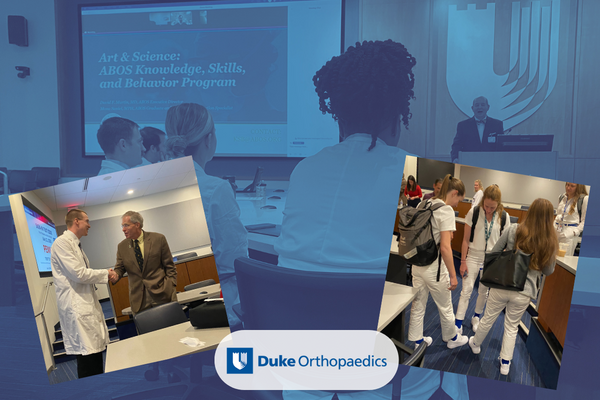Duke Ortho Launches ABOS Knowledge, Skills, and Behavior Program for Residents

Today, Duke Ortho formally launched the use of the American Board of Orthopaedic Surgeons (ABOS) program. From now on, the department will utilize KSB as the primary mechanism for resident feedback and evaluation. Duke participated in the 2017 field trial of KSB.
David Martin, MD, Executive Director of the American Board of Orthopaedic Surgery (ABOS), and Mona Saniei, MPH, ABOS Professional and Graduate Medical Education Specialist, presented the tenants and tools connected to the KSB program.
“This is a competency-based medical education (CBME) model,” stated Dr. Martin. He continued, “The ABOS mission is to ensure the safe, ethical, and effective practice of orthopaedic surgery. The ABOS maintains the highest standards of education, practice, and conduct through examination, certification, and maintenance of certification for the benefit of the public.”
ABOS plans to evaluate resident competence by KSB as a prerequisite for taking the Part 1 Board Exam. They have been working to align with the Accreditation Council for Graduate Medical Education (ACGME), the American Academy of Orthopaedic Surgeons (AAOS), and the American Orthopaedic Association – Council of Orthopaedic Residency Directors (CORD) before making that prerequisite, but it is forthcoming.
To get our department used to KSB and its features, we are Initiating bi-weekly requests for surgical Evaluations, and end-of-rotation professional evaluations will be required and monitored for all residents.
Martin continued, “We can all improve from feedback. We aim to measure residents' knowledge, judge their competency to do their job expertly, and prepare them to practice in the field.” This is done by assessing through the Ortho-in-Training Exam (OITE), the ABOS Part I examination, as well as through behavior reviews and evaluations of surgical skills.
He explained that the ‘art’ of this CBME model is selecting representative questions from a vast body of knowledge. As a result, we continually review and assess the predictive value of the OITE.
Who evaluates the residents? Saniei responded, “Evaluations come from attendings, co-residents, nurses, and APPs. Using the ABOS app, these individuals have a functional, user-friendly portal and dashboard at their disposal 24x7.
Martin concluded, “We know that orthopaedic surgeons learn at different rates. Providing residents with a steady pace of assessments allows for correction, improvement, and better communication.”